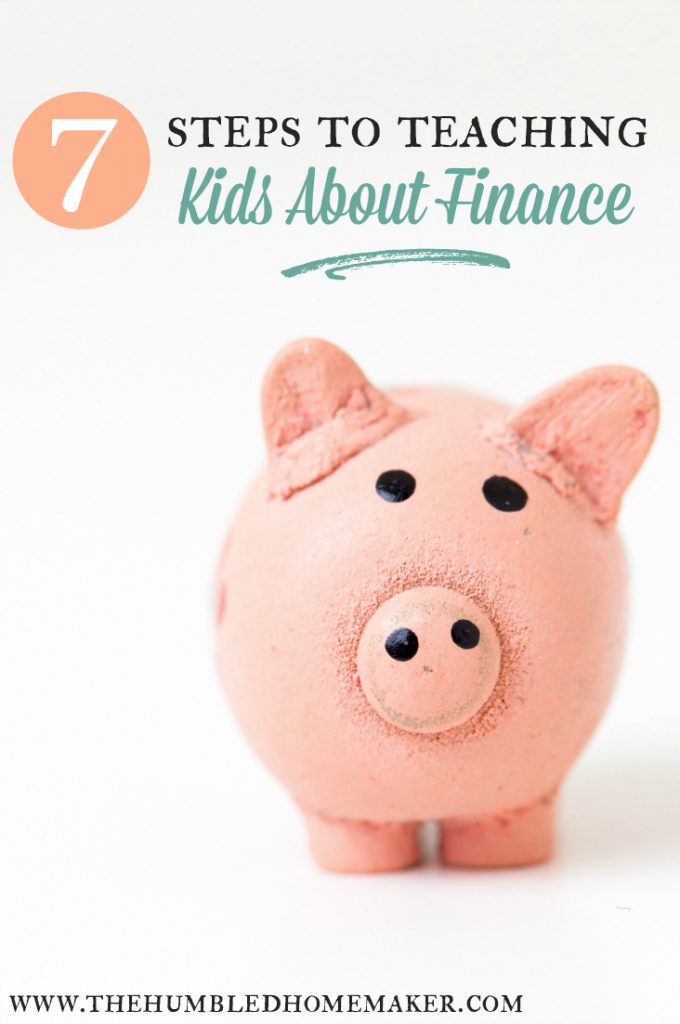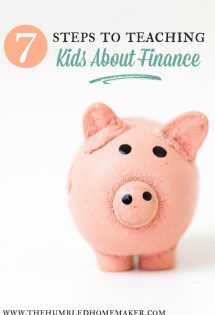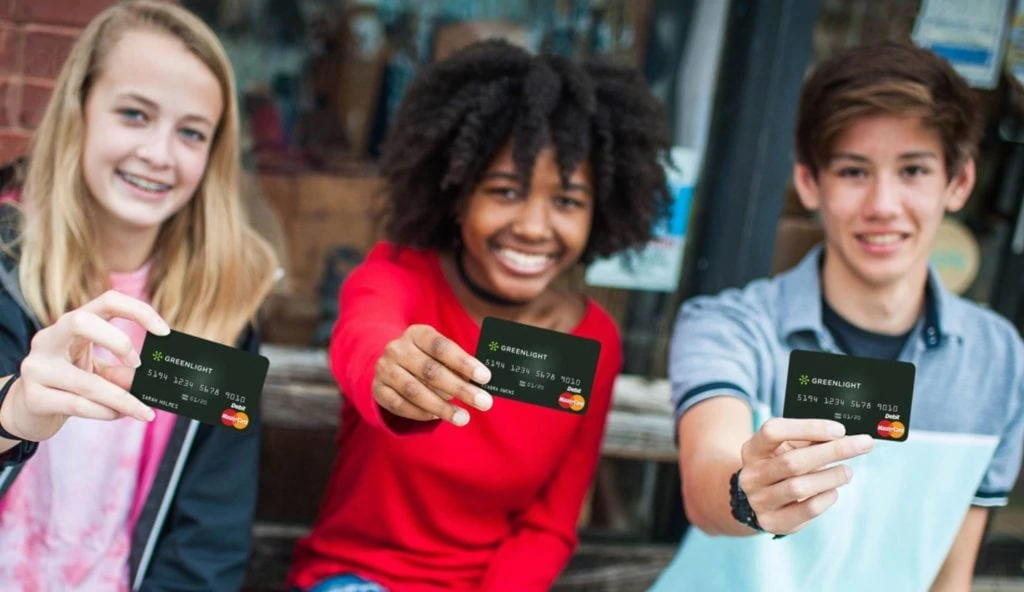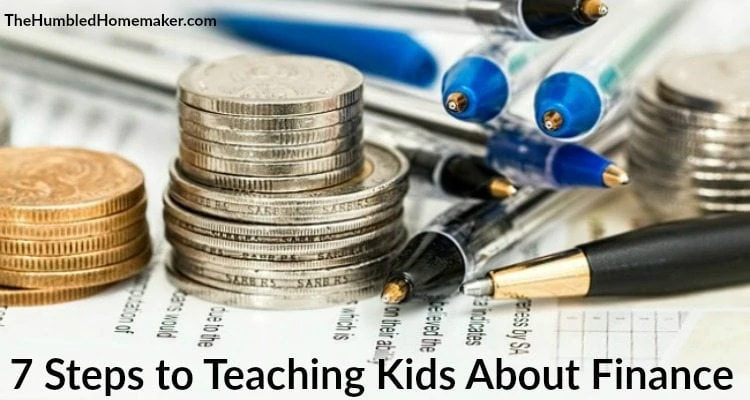Inside: In today’s world, teenagers can get their first credit card before learning anything about money management skills! As parents, we should BEGIN teaching kids about finance during childhood!

From Erin: This topic is very important to me and Will, as we both felt like we had to learn the ropes of money management largely on our own. We are now trying to teach financial skills to our three girls. I hope you will enjoy this advice as much as we did!
By Elizabeth Menon
It still amazes me that kids can get their first credit card when they turn 18, and often be knee-deep in debt shortly after, because they have never been taught basic financial lessons and money management skills.
How practical it would be if all schools taught a Finance 101 course in order to prepare kids to be financially responsible adults. Although they may exist, I have yet to hear about any schools that teach this topic, therefore leaving it the sole responsibility of the parent to prepare their children.
Even before I started homeschooling my children a year and a half ago, my husband and I agreed teaching our kids about finances was vital. In my opinion, the earlier the better.
Here are some suggestions on how to go about increasing your child’s financial awareness.
1. Start by explaining the basics about money.
A little after our kids turned 3, we would take money out and let our kids play with it while we explained the value of each coin or bill that they were holding. We let them sort it and stack it, all while having discussions on what the money was supposed to be used for.
2. Explain about prices of goods.
I am a strong proponent of having our kids know as much as possible about how much things cost, and choose various opportunities to point out prices of items that we purchase. Once they understood that items had a cost associated with them, my daughters started to be aware and more cautious of toys or other non-essential items they asked for.
3. Talk to them! Encourage questions.
I have always encouraged my kids to ask financial questions and will always answer them honestly with responses that are appropriate to their ages. However, I explained early on after a couple of embarrassing questions, that all money and financial queries should be directed toward either my husband or myself.
4. Devise a method for earning.
Once your kids are old enough, devise an allowance program that works for your family. We have a reward system in place that we started when our daughters were about 6 and 7, enabling them to save their own money for the toys they want. I feel the patience and hard work required to save up for something they want to buy is an invaluable experience. Now that they buy most of their own toys, the pride of ownership for their things is exceptional.
5. Teach them how to record keep.
Once you have a system in place for allowing your kids to earn their own money, help them learn how to keep track of it. Let them record their money the way adults do by giving them an unused checkbook register. If they are still working on their math skills, fill out the register with them. This will help teach them early accounting skills as well as provide a visual record for their money goals.
6. Allow your kids to research toys or items they want.
At first I wasn’t sure if I liked the idea of my kids constantly looking up toys to buy, but then I realized I’d use that passion and make it productive. Now when they research an item they want, they not only read the reviews to make sure it’s a worthwhile investment for them, but they know how to price compare between the different stores in order to get the best deal.
7. Teach your kids about different long term savings vehicles.
Introduce your kids to 529s, retirement accounts and the stock market. This topic will be more advanced, but younger kids can benefit from being introduced to the subjects as well. We have only briefly explained to our kids what 529s and retirement accounts are, however, I did teach about the stock market as one of our math subjects last year.
In the last three years that we’ve worked with our kids with money, I have seen a financial maturity take place. They have learned values like hard work, patience, and appreciation. I’m confident with the tools we are giving them, we are preparing them for the financial challenges that lay ahead.
How are you currently teaching your kids about finance?
Elizabeth is a homeschooling mom of 3 daughters ages 1, 7 and 9. Her interests include traveling with her family, upcycling small projects, all topics health related and reading historical fiction. God, her husband, and her children are the most near and dear to her heart.









Sheila
I am always bothered by the idea that the schools should be teaching so many things. Parents should be teaching their kids these types of lessons, just in the same way parents should teach their kids how to cook, manage a home, fill a car with gas, etc. That is my viewpoint, at least. I’m the parent of a 19 year old private school graduate and a 16 year old public school student, not a homeschooler. As you begin to think about older kids, I think handing them responsibility to manage things on their own is important. Something that worked very well for us was that I gave them their clothing budget to manage at about age 15. I do mean that I actually gave it to them, too. They have both done quite well with it. I felt they needed something that meant something to them and and I wanted them to handle actual money while still at home. For our college daughter, we told her how much we were giving her and she has managed it very well. I’m quite proud of her for it because it meant she had to make choices that her friends’ whose parents were simply paying the bills didn’t have to do.
Erin
I agree that parents need to be the main ones teaching! Thanks for sharing your experience, Sheila!
Becca
I think it’s important to teach kids the difference between wants and needs. I’m about a semester away from finishing my Masters in Development, and as a family we’ve travelled to quite a few poorer countries, so it’s quite natural for us to have conversations about conditions in the developing world. Having experiences like playing with street children in Cambodia have taught my children that they don’t really need fancy toys to have fun, and that they’re fortunate to have their actual needs met (food, clean water, health care, education, shelter, clothes) when so many other children don’t. My husband’s a CPA and financial planner, so again, conversations about money are just an every-day part of our household. We talk about comparing unit prices when we shop; we talk about saving money, the value of paying taxes (this is where those visits to poor countries come into play too, because they don’t have a solid tax base and so they can’t provide services to their citizens), setting financial goals, etc.
Erin
I love that you’ve taken your children around the world! We have only taken ours to Costa Rica (and Canada–does that even count?! lol) so far, but we hope to take them more places as they get older. A true sense of needs vs. wants is huge!
Becca
My parents and siblings lives in the US, my husband and kids and I live in Australia, so we’ve got to travel to see each other. Also, in recent years, Australia has had some very cheap airfares. Return tickets to Asia are typically under $300; once you’re over there, food and accommodation are very cheap; and a nice little perk of Australia is that they pay you more when you’re on annual leave, meaning, we generally save even more money while we’re on holidays.
Erin
I just have to say: “I bet Australia is GORGEOUS!”
Morgan
I absolutely love this post! Some parents totally neglect teaching their children about finances, so it’s really refreshing to see people like you taking it seriously! It’s so important to enforce this knowledge early on so that your children grow up keeping finances and budgeting in mind. Very nice work! Thanks so much for sharing your tips!
GOPAL
THANKYOU FOR SHARING SUCH AN AMAZING BLOG
PAT Finance
if I liked the idea of my kids constantly looking up toys to buy, but then I realized I’d use that passion and make it productive. Now when they research an item they want, they not only read the reviews to make sure it’s a worthwhile investment for them, but they know how to price compare between the different stores in order to get the best deal.
lisa
Thanks for the nice blog..I have very less knowledge regarding law and finance and want to increase my knowledge. Consultant
lisa
I can completely relate to what you’re saying about finding the right “fit” where you work. We spend so much time at work, on some days, my time at work is longer than my time with my own family. So it means so much to “get” the folks we work with. It can make all the difference in the world. To our creativity, our emotional well being, and just being able to cope with a difficult day. Thanks for all your insight, it was a fun read learning more about you.Commercial Umbrella Insurance
lisa
This is some thing very informative and point to point. There is no round and round in this article. Like this smplicity . This clears my old point of view. Informative Articles for Texas Insurance Topics